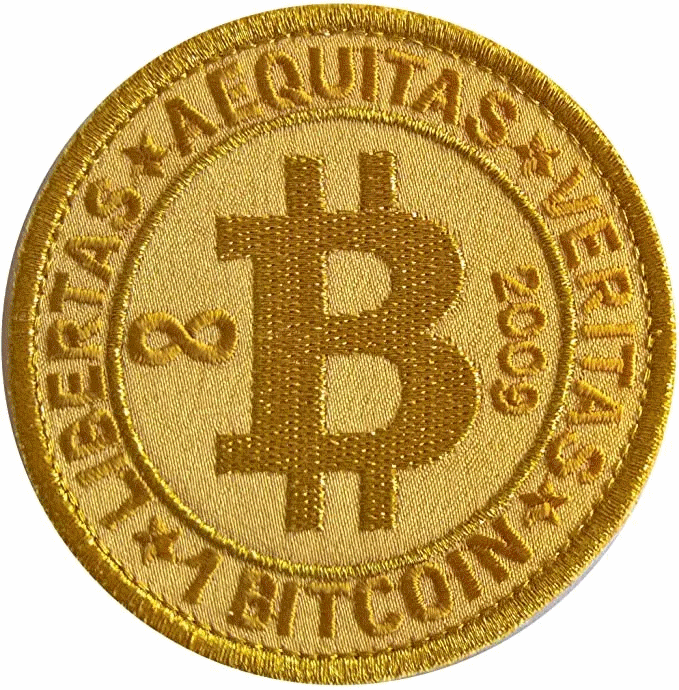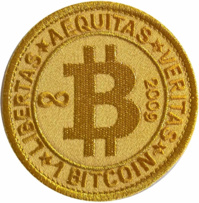IMAGE SOURCE
This past week was pretty busy for me on several fronts. Yesterday, when I was speaking to a friend and colleague, he mentioned that bitcoin was going to the moon. Usually when we say “bitcoin is going to the moon” it’s an expression used when the price of the coin is off the charts. But that hasn’t been the case in recent weeks and the entire market has been going sideways. Literally in this case both bitcoin and ethereum are going into orbit. BitMEX announced that it wants to deposit a single wrapped bitcoin on the surface of the moon. The crypto exchange said that it plans to deposit a physical wallet containing a single bitcoin on the surface of the moon. The wallet will be in the form of a commemorative coin. On June 3, a SpaceX rocket took off, carrying an Ethereum node for SpaceChain. The Ethereum node will be installed and run in the International Space Station. SpaceChain offers blockchain custody services and claims this project is a sign of decentralization and censorship resistance of blockchain technology. Institutional clients will get access to the node to better their security and protect their digital assets. But this is just the first of the two missions that will put crypto into orbit. The second is scheduled for June 24, and the mission will focus on installing on a YAM-2 satellite, the nodes created for the cryptocurrency exchange Biteeu as well as for a community project called Divine. This second mission will also install a third bitcoin satellite node for the Nexus platform. When I heard this, I wondered why would someone want to put a crypto node into space. On the surface crypto and space seem like an odd fit. But after giving some more thought, space exploration fits with the ideological and practical effects of cryptocurrency. More importantly, blockchain holds the key to democratizing the space industry and unlocking its fullest potential.
The truth is that these recent announcements are not the first attempts to fuse crypto and space. For some time now, the crypto industry has been interested in conquering space.
Large space firms are adopting blockchain technology. Giants like NASA and ESA are studying ways to use this technology for their next missions. The results suggest that the blockchain could be useful both on Earth and in space. Another fundamental application of the blockchain technology finds its source in smart-contracts. It consists of introducing an open source computer program that will work autonomously within the chain and without the intervention of any third party. This could definitely improve the efficiency and rapidity of the administration of space agencies and companies.
With the space industry rocketing in value to $423.8 billion in 2019, the global space industry is expected to generate revenue of at least $1.4 trillion by 2030. A number of startup companies are vying for a piece of the action and blockchain can fuel the commercial space race by opening up access to the market.
Blockstream Satellite is a service which provides a broadcast of bitcoin blockchain data via a network of geosynchronous satellites. This broadcast streams the entire bitcoin blockchain from six satellites strategically positioned in orbit around Earth to reach all major landmasses. Further, Blockstream’s satellite API lets users send encrypted messages to each other from some of the remotest regions on earth and pay for those messages in bitcoin using the Lightning Network, which is designed to open up bitcoin to the higher transaction volumes associated with wider retail adoption. Since 2018 the company has been working on its satellite service to allow any user to have access to the data transmission service on a global scale, even without the need for the Internet.
Once the Ethereum node is installed, tested and activated on the International Space Station, the space node will enable SpaceChain customers to further enhance their blockchain capabilities for enterprise business and fintech applications, and perform highly secure on-orbit Ethereum multi-signature transaction services, with data uplinked and downlinked directly through a dedicated space encrypted communication network. In practice, this node will be accessible by the Nexus company and will allow it to develop various commercial applications
Earlier this year in March, the world’s first bank-led tokenised value transfer was executed in space. JP Morgan successfully tested a blockchain transaction via smart contracts on a blockchain network, established between satellites orbiting the earth. This breakthrough opens the door to a potential peer-to-peer satellite marketplace in the long term, allowing data transfers between satellites against payment, as private companies prepare to launch their own constellations.
This month, IoT firm WISeKey is launching the first part of a non-fungible token ecosystem aboard a SpaceX Falcon 9 rocket. A WISeKey device will be attached to the exterior of the deployer, and be exposed to space for several weeks. This period in Earth’s low orbit will therefore be a first demonstration of WISeKey’s space-based WISeSat ecosystem.
SpaceX will launch the “DOGE-1 Mission to the Moon” in the first quarter of 2022, with the company accepting the dogecoin as full payment for the lunar payload. The mission’s financial value was not revealed, but DOGE-1 will fly a 40 kilogram cube satellite as a payload on a Falcon 9 rocket.
Space is the next innovation frontier for businesses, and by integrating blockchain with satellite infrastructure, we can take global collaboration to greater heights. Blockchain can provide decentralized and secure way for processing and manipulating space resources as space digital tokens. Tokenizing space resources such as orbits, satellites, spacecraft, orbital debris, asteroids, and other space objects in the form of blockchain-based digital tokens could allow us to accept requests from businesses and ordinary users on Earth in a more secure manner, potentially creating a new economic model where more people have access to resources in space.
This past week was pretty busy for me on several fronts. Yesterday, when I was speaking to a friend and colleague, he mentioned that bitcoin was going to the moon. Usually when we say “bitcoin is going to the moon” it’s an expression used when the price of the coin is off the charts. But that hasn’t been the case in recent weeks and the entire market has been going sideways. Literally in this case both bitcoin and ethereum are going into orbit. BitMEX announced that it wants to deposit a single wrapped bitcoin on the surface of the moon. The crypto exchange said that it plans to deposit a physical wallet containing a single bitcoin on the surface of the moon. The wallet will be in the form of a commemorative coin. On June 3, a SpaceX rocket took off, carrying an Ethereum node for SpaceChain. The Ethereum node will be installed and run in the International Space Station. SpaceChain offers blockchain custody services and claims this project is a sign of decentralization and censorship resistance of blockchain technology. Institutional clients will get access to the node to better their security and protect their digital assets. But this is just the first of the two missions that will put crypto into orbit. The second is scheduled for June 24, and the mission will focus on installing on a YAM-2 satellite, the nodes created for the cryptocurrency exchange Biteeu as well as for a community project called Divine. This second mission will also install a third bitcoin satellite node for the Nexus platform. When I heard this, I wondered why would someone want to put a crypto node into space. On the surface crypto and space seem like an odd fit. But after giving some more thought, space exploration fits with the ideological and practical effects of cryptocurrency. More importantly, blockchain holds the key to democratizing the space industry and unlocking its fullest potential.
The truth is that these recent announcements are not the first attempts to fuse crypto and space. For some time now, the crypto industry has been interested in conquering space.
Large space firms are adopting blockchain technology. Giants like NASA and ESA are studying ways to use this technology for their next missions. The results suggest that the blockchain could be useful both on Earth and in space. Another fundamental application of the blockchain technology finds its source in smart-contracts. It consists of introducing an open source computer program that will work autonomously within the chain and without the intervention of any third party. This could definitely improve the efficiency and rapidity of the administration of space agencies and companies.
With the space industry rocketing in value to $423.8 billion in 2019, the global space industry is expected to generate revenue of at least $1.4 trillion by 2030. A number of startup companies are vying for a piece of the action and blockchain can fuel the commercial space race by opening up access to the market.
Blockstream Satellite is a service which provides a broadcast of bitcoin blockchain data via a network of geosynchronous satellites. This broadcast streams the entire bitcoin blockchain from six satellites strategically positioned in orbit around Earth to reach all major landmasses. Further, Blockstream’s satellite API lets users send encrypted messages to each other from some of the remotest regions on earth and pay for those messages in bitcoin using the Lightning Network, which is designed to open up bitcoin to the higher transaction volumes associated with wider retail adoption. Since 2018 the company has been working on its satellite service to allow any user to have access to the data transmission service on a global scale, even without the need for the Internet.
Once the Ethereum node is installed, tested and activated on the International Space Station, the space node will enable SpaceChain customers to further enhance their blockchain capabilities for enterprise business and fintech applications, and perform highly secure on-orbit Ethereum multi-signature transaction services, with data uplinked and downlinked directly through a dedicated space encrypted communication network. In practice, this node will be accessible by the Nexus company and will allow it to develop various commercial applications
Earlier this year in March, the world’s first bank-led tokenised value transfer was executed in space. JP Morgan successfully tested a blockchain transaction via smart contracts on a blockchain network, established between satellites orbiting the earth. This breakthrough opens the door to a potential peer-to-peer satellite marketplace in the long term, allowing data transfers between satellites against payment, as private companies prepare to launch their own constellations.
This month, IoT firm WISeKey is launching the first part of a non-fungible token ecosystem aboard a SpaceX Falcon 9 rocket. A WISeKey device will be attached to the exterior of the deployer, and be exposed to space for several weeks. This period in Earth’s low orbit will therefore be a first demonstration of WISeKey’s space-based WISeSat ecosystem.
SpaceX will launch the “DOGE-1 Mission to the Moon” in the first quarter of 2022, with the company accepting the dogecoin as full payment for the lunar payload. The mission’s financial value was not revealed, but DOGE-1 will fly a 40 kilogram cube satellite as a payload on a Falcon 9 rocket.
Space is the next innovation frontier for businesses, and by integrating blockchain with satellite infrastructure, we can take global collaboration to greater heights. Blockchain can provide decentralized and secure way for processing and manipulating space resources as space digital tokens. Tokenizing space resources such as orbits, satellites, spacecraft, orbital debris, asteroids, and other space objects in the form of blockchain-based digital tokens could allow us to accept requests from businesses and ordinary users on Earth in a more secure manner, potentially creating a new economic model where more people have access to resources in space.

Ilias Louis Hatzis
Ilias Louis Hatzis is the Founder & CEO at Mercato Blockchain Corporation AG.
Ilias Louis Hatzis is the founder and CEO at Kryptonio wallet. Create your wallet in less than a minute, without seed phrases, private keys, passwords or documents. Keep your bitcoin and digital assets always secure and recoverable: https://kryptonio.com
I have no positions or commercial relationships with the companies or people mentioned. I am not receiving compensation for this post.
Ilias Louis Hatzis is the founder and CEO at Kryptonio wallet. Create your wallet in less than a minute, without seed phrases, private keys, passwords or documents. Keep your bitcoin and digital assets always secure and recoverable: https://kryptonio.com
I have no positions or commercial relationships with the companies or people mentioned. I am not receiving compensation for this post.
Autres articles
-
Revolut obtient une licence bancaire au Royaume-Uni
-
Nominations | Eight Advisory annonce deux nouveaux associés en France
-
NFT : L'Opéra de Paris dévoilera à la rentrée une nouvelle collection d'art numérique
-
WEB3 : L'Europe, le baby-blues des licornes ?
-
Finyear, partenaire média de la prochaine édition de l'IPEM Paris

















